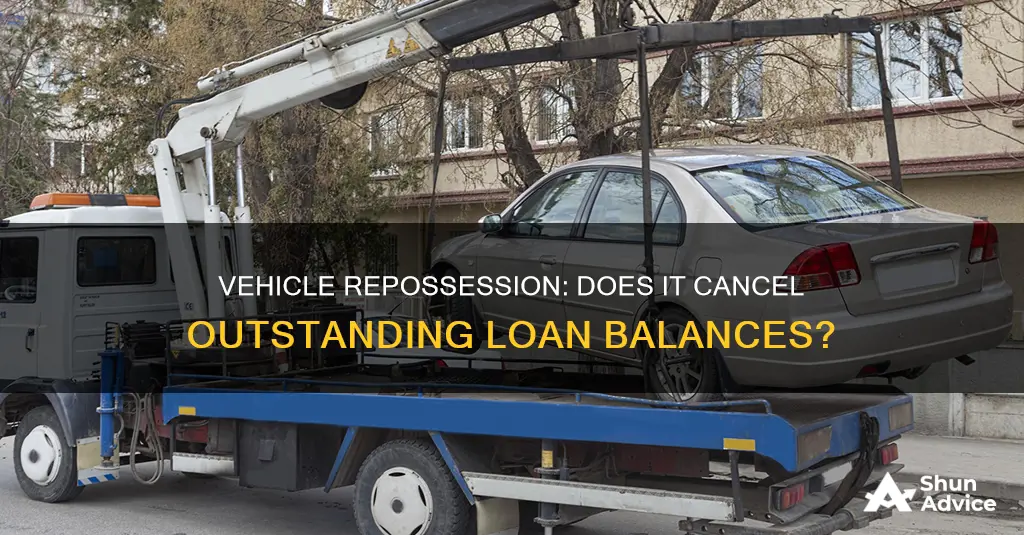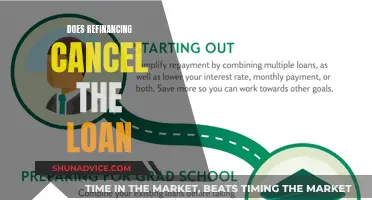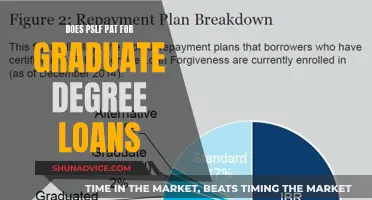
Repossession of a vehicle does not cancel the loan. If your vehicle is repossessed and sold, you may still be responsible for paying the difference between the amount left on your loan, plus repossession fees, and the sale price. This is known as a deficiency balance. In some states, you have the right to reinstate your loan by paying overdue payments and additional costs associated with repossession. It is important to note that repossession can negatively impact your credit score and make it harder to obtain loans in the future.
| Characteristics | Values |
|---|---|
| Who can repossess the vehicle? | Lender or leasing company |
| When can the vehicle be repossessed? | When the borrower defaults on the loan or misses a payment |
| Is warning required before repossession? | No, but some states require a notice |
| What happens after repossession? | The lender can sell the vehicle at a auction or keep it to cover the debt |
| Can the borrower buy back the vehicle? | Yes, by paying the full amount owed and any repossession expenses |
| What if the borrower can't buy back the vehicle? | The borrower may be responsible for paying the difference between the loan amount and the sale price, known as a "deficiency balance" |
| How does repossession impact the borrower's credit score? | It can negatively impact the credit score and make it harder to obtain loans in the future |
| What can the borrower do to avoid repossession? | Communicate with the lender, negotiate a new payment schedule, or consider refinancing or loan modification |
What You'll Learn

Lenders can repossess vehicles without warning
Repossession of a vehicle does not cancel the loan. If your vehicle is repossessed and sold, you may still be responsible for paying the difference between the amount left on your loan, plus repossession fees, and the sale price. This is known as a "deficiency balance". If the car is sold for more than what you owe, you are entitled to receive the surplus.
In some states, lenders are not required to give you notice before seizing your vehicle, so fast action is vital. If you fall behind on your payments and your vehicle is at risk of repossession, there are multiple paths to avoid repossession. You can consider modifying or refinancing your loan. For example, your lender may agree to refinance your car loan, or you may find another lender that will. However, be careful not to refinance for more than your car is worth. You can also request forbearance or reinstatement of your loan. If you are an active-duty servicemember, the Servicemember Civil Relief Act (SCRA) prohibits repossessions without a court order.
In addition, lenders cannot "breach the peace" when they take your vehicle. In some states, this means that they cannot use physical force, threaten to use force, or remove your car from a closed garage without your permission. If your lender breaches the peace, you can submit a complaint and/or pursue legal action in court.
How Realtors Can Help Secure Your Dream Home Loan
You may want to see also

Buyers can dispute repossessions
Repossession of a vehicle can be a stressful and financially difficult experience. However, buyers can dispute a repossession if they believe it was done in error. It is important to act quickly and contact the lender or servicer immediately to resolve the issue. If the dispute is not resolved, buyers can submit a complaint or pursue legal action in court.
In many states, lenders can repossess a vehicle without a warning or court order as soon as the loan or lease is defaulted on. However, some states require lenders to send a notice before repossession, allowing time to make up missed payments. Buyers should be aware of their state's laws and their rights in the event of a repossession.
If the repossession was indeed done in error, buyers can dispute it with credit reporting companies to have it removed from their credit report. A repossession can negatively impact a buyer's credit score and make it more difficult to obtain loans in the future, so it is important to address any errors promptly.
Additionally, some states grant buyers the right to reinstate their loan by paying overdue amounts and any additional costs associated with the repossession. This process may be referred to as "curing" or "reinstating" the loan. Even in states without these laws, buyers have certain rights, such as the right to be notified before their vehicle is sold or kept as compensation for their debt.
It is important to note that lenders are generally allowed to charge a fee for picking up a repossessed vehicle, and buyers may be responsible for any remaining debt after the vehicle is sold. Buyers should also be aware of their rights regarding the retrieval of personal belongings from a repossessed vehicle and consult an attorney if they believe their rights have been violated.
RD Loan: Drop-off and What Comes After
You may want to see also

Repossession impacts credit scores and future loans
In some states, you have the right to reinstate your loan by paying overdue amounts and the lender's repossession costs, which can include storage, sale preparation, and attorney fees. This process is known as "curing" or "reinstating" your loan. You may also be able to buy back the vehicle at auction or pay the full amount you owe, including past-due payments, remaining debt, and repossession costs.
It is important to note that lenders can repossess your vehicle as soon as you miss a payment, but it typically occurs after 90 days of non-payment. Some lenders may install a "starter interrupt" or "kill switch" device, preventing the vehicle from starting if payments are not made on time. This can be considered a repossession or a breach of peace, depending on your state's laws.
To avoid repossession, you can request forbearance, modify or refinance your loan, or contact your lender to discuss alternative arrangements. Acting quickly and being honest about your situation is crucial. Remember that repossession can have significant consequences on your creditworthiness and future financial endeavours.
QuickBooks Loan Amortization: Schedule and Repayment Strategy
You may want to see also

Buyers can reinstate loans and avoid repossession
Repossession of a vehicle does not cancel the loan. Even if your car has been repossessed, you're still responsible for your car loan and all the costs related to the repossession and sale. These costs typically include towing, cleaning, and processing fees from the repo company.
If you're facing vehicle repossession, it's important to understand your options. One option is to reinstate your loan, which can help you avoid repossession and keep your car. Here's what you need to know about reinstating your loan:
Understanding Reinstatement
Reinstating a loan means bringing the loan current by paying all past-due payments, late fees, and the lender's repossession costs. Once the loan is reinstated, you can take your car back and resume regular loan payments. While reinstatement doesn't remove the late payments from your credit report, it does show that you've taken steps to resolve the issue, which can help improve your creditworthiness.
Your Rights and Options
In some states, laws grant you the right to reinstate your loan and avoid repossession. Even if your state doesn't explicitly provide this right, some lenders may still offer reinstatement as an option. Check your loan agreement for any mention of reinstatement, as it is usually included as a clause in auto loan contracts.
Taking Action
If you're interested in reinstating your loan, act quickly. Contact your lender right away and request a reinstatement quote in writing. This quote will include the total amount needed to bring your loan current, as well as the timeframe for doing so. Lenders are typically only required to honor a reinstatement quote for a limited time, often around 10 to 15 days.
Negotiating and Exploring Alternatives
If the terms of the reinstatement quote are not feasible for you, consider negotiating with your lender. They may be willing to work with you to find a solution. Additionally, explore other options such as refinancing, extending the loan, or setting up a payment plan to help you get back on track with your payments.
Remember, the best way to avoid repossession is to stay current on your loan payments. If you're struggling to make payments, don't hesitate to reach out to your lender to discuss your options and find a solution that works for both parties.
Refinancing: Loan Length, Change and What You Should Know
You may want to see also

Buyers can buy back repossessed vehicles
Repossession of a vehicle does not cancel the loan. If your car is repossessed, you are still responsible for paying the difference between what you owe on your contract and what your lender gets for selling the car, which is called the "deficiency". This can include fees related to the repossession, early termination of your lease, or early payoff of your financing. Late payments or repossession can also stay on your credit report for up to seven years, making it harder or more expensive to get loans in the future.
Depending on your state's laws, you may be able to buy back your repossessed vehicle. In some states, you have the right to pay to get your vehicle back after it has been repossessed. This process is called "curing" or "reinstating" your loan, and it involves paying overdue payments as well as additional costs associated with repossession. Even if your state does not allow you to cure or reinstate your loan, you have certain rights, such as the right to be notified before your vehicle is sold or kept as compensation for your debt. This gives you the opportunity to buy it back at auction or before it is sold.
If you are unable to buy back your repossessed vehicle, your lender may keep it to cover your debt or sell it. In some states, your lender must notify you of the date, time, and place of the sale so that you can bid on the vehicle. If the lender sells the car for more than what you owe, you are entitled to receive the surplus. However, if the car sells for less than you owe, you may be sued for the difference, or "deficiency", plus any applicable fees.
It is important to note that repossession can have negative consequences on your credit score and future loan prospects. It is recommended to contact your lender as soon as possible if you are having trouble making payments, as they may be willing to work with you to delay or revise your payment schedule.
Exploring RCPL's Interlibrary Loan Services and Accessibility
You may want to see also
Frequently asked questions
Repossession occurs when you default on your auto loan payments and your lender takes your vehicle away. This can happen without warning in many states, but some require lenders to notify you before repossession. After repossession, your lender can either keep the vehicle or sell it at an auction. If the lender sells the car for less than what you owe, you will have to pay the difference, known as a "deficiency balance".
In some states, you have the right to reinstate your loan by paying overdue payments and additional costs associated with repossession. You may also be able to buy back the vehicle by paying the full loan amount, plus repossession costs.
If you are having trouble making car payments, contact your lender as soon as possible. Many lenders will work with you if they believe you will be able to pay soon. You might be able to negotiate a delay or revised schedule of payments. You can also consider modifying or refinancing your loan.







